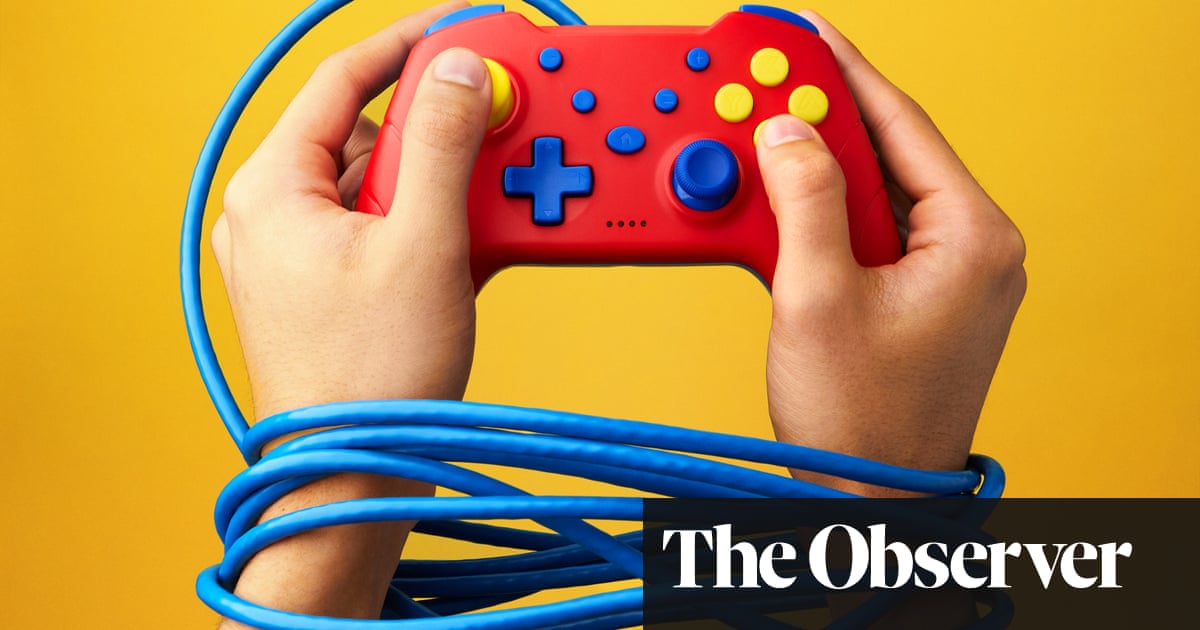
all Guys had only been online for two days when it started. This bright, silly multiplayer game, in which rotund Day-Glo bean people race toward a finishing line avoiding giant tumbling fruit pieces – a sort of digital equivalent of a school sports day, albeit a slightly hallucinogenic one – had tens of thousands of players, but it didn’t seem like it would attract cheaters. Surely it was too frivolous, too much about the shared joy of slapstick comedy? Yet in they came: players using speed hacks (a type of cheat that increases the speed your avatar can run at) to win races against other Day-Glo bean people. A totally meaningless, seemingly reward-free victory. Why?
For many, cheating utterly ruins the experience of a multiplayer video game. Even if you are not directly affected, it breaks the social contract. “When people play a competitive game together, they conjure the world of that game into existence through mutual agreement: this is the aim, these are the restrictions on how we can achieve that aim,” says game designer Holly Gramazio. “When you realise that someone is cheating, it can disrupt that mutual agreement and call the whole experience into question.”
Unfortunately, there is a chronic cheating problem in online multiplayer games. The servers of first-person shooters such as Call of Duty, PUBG and Counter-Strike are utterly rife with cheaters, most of whom download special software that alters the game in their favour. That might be aimbots, which make it easy for them to shoot other players; wall hacks, which render walls invisible so players can easily spot their opponents; or speed hacks, which allow them to move much faster. Such hacks are largely confined to PC games, where players are able to alter the code in client software, but console games are also vulnerable to exploits (using errors in a game design to get an advantage) and “lag switching” (disrupting the network communication to other players). Now that many multiplayer titles allow cross-platform play, PlayStation and Xbox owners are coming up against PC players who are using hacks to get an advantage.
And this isn’t only in professional and competitive leagues and ranked matches, where there are prizes at stake. This is on public servers against complete strangers with nothing tangible at stake apart from a few stats. Publishers are doing what they can to address the issue, utilising third-party anti-cheat systems such as BattlEye, while working on patches to block cheat programs and remove players who use them. Last week, Activision banned 60,000 players from its battle royale game Call of Duty: Warzone for using cheat software – over 300,000 permanent bans have now been administered. And that’s just one game. The problem is, when one cheat app is blocked another is developed and distributed. Demand is high. Why? Why are people cheating this much?
In her fascinating 2007 book Cheating, Mia Consalvo develops the concept of “gaming capital”, a variation on Pierre Bourdieu’s theory of “cultural capital”, which defines the standing of a gamer within their peer group. Gaming is a subculture, with its own rules, hierarchy and status objects, and achieving success or a higher position within a subculture, is for many, reason enough to cheat.
In multiplayer games such as Call of Duty, Fortnite and Apex Legends, there are cosmetic items, such as outfits and gun decorations, that are only available to players who have reached certain rankings and therefore act as visual signifiers of status within the game world. Attaining these intrinsic status symbols might be enough of a motivation for some players; like stealing fashionable trainers, or buying knock-off branded clothes. The motivation to carry out conscious or unconscious activities in order to gain peer respect, a process known as “impression management”, is a powerful one, especially in an insular, competitive environment.
The psychologist Corey Butler, who has written about cheating in board games, sees this component as a major motivator for cheats – the sheer pressure to maintain self-esteem and social status can be overwhelming. “The motivation is related to self-enhancement and impression management,” he writes. “We all like to feel good about ourselves and look good in front of others. Indeed, self-esteem is a powerful motivation in social psychology, right up there with other core human motives like food and safety.”
For some gamers, there is perhaps also an underlying sense of entitlement. “I wonder whether there’s something around cheating that can come from a sense of deserving the win, of having enough gaming capital that cheating to get the win is alright for you,” says Gramazio. “Maybe you feel that the work you’ve put into figuring out how to cheat makes the action valid. Maybe you just feel like you’re so dedicated and involved in the game that you deserve the win, even if you can’t get it legitimately.”
Cyber-psychologist Berni Good argues that the very nature of video games give tacit permission to cheat. “Players can cheat and not have face to face contact – social norms differ in a virtual world,” she says. “Gamers have always used cheats, tips, previews and walkthroughs, it’s always been part of the culture, it’s just that more people are playing multiplayer than, say, 20 years ago. In fact, if you think about it, the game ‘cheats’ too when for example a player’s character gets defeated and then rejuvenated.” If death does not mean death in a game, then is cheating really cheating?
There are also important moral distinctions to be made between different forms of cheating. Gramazio is the editor of Bernard de Koven’s wonderful book The Infinite Playground about the shared imaginative spaces that games provide and the ways in which rules and regulations can be altered by players to enhance the experience. A good example from board games is Monopoly, where some families agree to stash all the money paid out in fines under the free parking square so that the player who lands there gets to keep it all. It’s a cheat, but it’s one all participants have agreed on and endorsed. An example from video games might be rocket jumping in Quake Arena – it’s cheating, but it is also an accepted tactic, so it’s fine.
There is also a difference between rule-breaking cheats and game-breaking cheats. Some people cheat just to further their own status within a game, but others cheat to break the game itself. This might be to specifically ruin the experience of others – known as griefing – or it might be to test themselves against the game’s creators. In this context of anarchy and sabotage, cheating IS the game. In his GDC talk about multiplayer online cheating, developer Jeff Morris refers to this demographic as Jimbo Jones cheaters, after the vindictive delinquent schoolboy in The Simpsons. “They’re bullies,” he says. “They want to take the game down – their opponent is the developer, from whom they get attention.”
The moral rules of video game participation are complex and ambiguous. We’ve grown up with cheat codes, pokes and exploits as an accepted element of play – designers themselves have often coded these elements into their own products. And the very structure of game worlds, with their hidden shortcuts and secrets, suggests to players that these are negotiable spaces, where law, morality and even geography, can be bent to the will of determined protagonists. Games are also places where victory is paramount, where winning is everything. So should we be surprised that people want to cheat?
When asked about the anthropological meaning of cheating for an NBC feature, the neuroscientist Don Vaughn stated: “The human brain never evolved a mechanism to separate a game from reality. If a lion was chasing one of our ancestors on the savanna, it was real, every time. There were no movies, plays or simulations. Modern neuroscience has revealed that just thinking about imagined situations activates the same brain regions as the actual experience. So when you have to pay $2,000 to your sister for landing on Boardwalk, your brain is really experiencing loss.”
The human brain is a puzzle-solving machine, constructed specifically to find shortcuts and advantages over predators and competitors. Maybe it’s that simple. We think, therefore we cheat.












